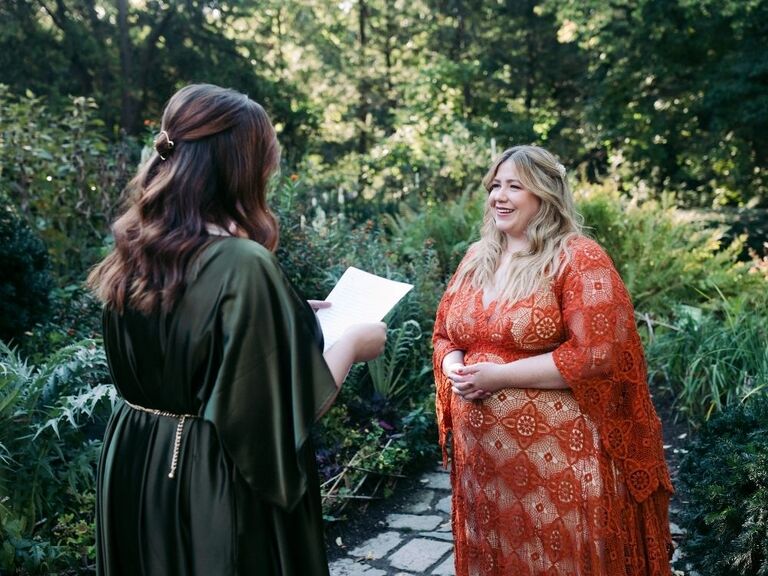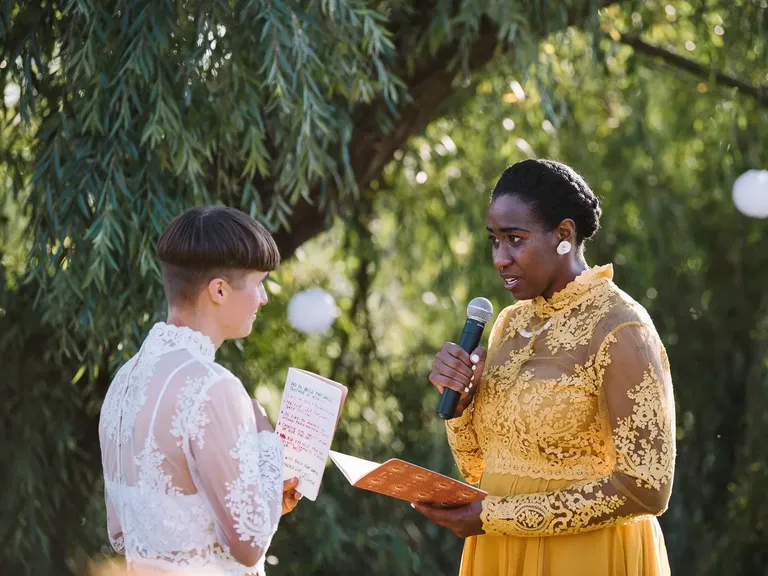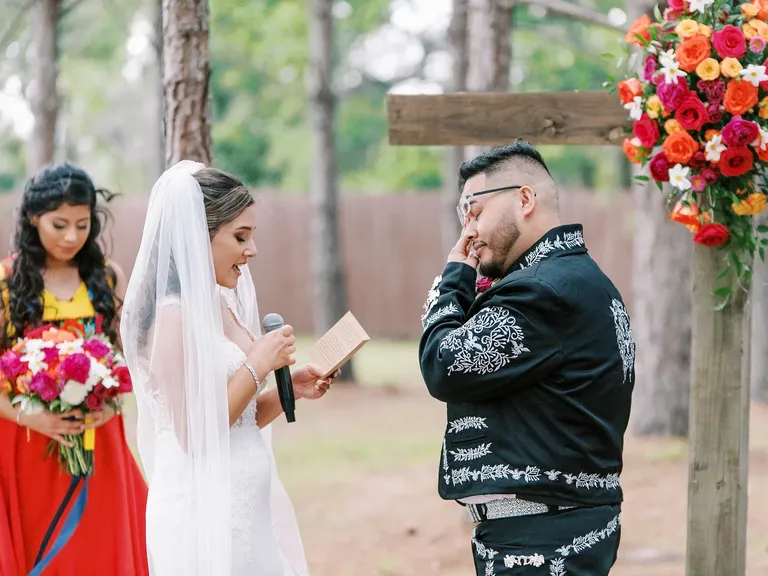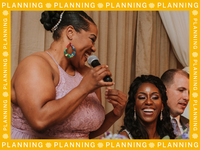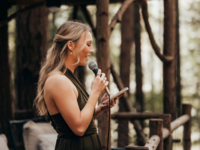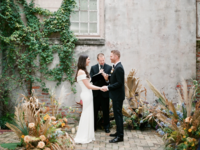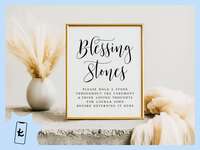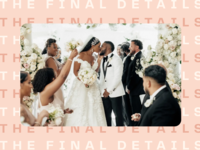How to Write Vows for a Memorable Wedding Ceremony
So you wondering how to write vows. After all, the promises you make to your partner on your wedding day are one of the most important aspects of the entire celebration. If you've decided to write your own vows, as opposed to exchanging traditional wedding vows or religious wedding vows, knowing exactly what to say can feel like a big challenge. With insights from some of our favorite wedding experts, we're taking a look at everything you need to know when writing your own marriage vows. From frequently asked questions to an outline to follow and even real examples you can copy, consider this your ultimate guide to how to write wedding vows you'll cherish forever.
Advice on Writing Wedding Vows in This Story: How to Write | Top Tips | FAQs
How to Write Wedding Vows
This is your step-by-step roadmap to how to write your own wedding vows that will be as memorable as they are meaningful. Use this guide on how to structure wedding vows to help you through every part of the writing process, from how to start wedding vows to how to end wedding vows. We're covering all you need to know about what to include in wedding vows to make writing your own wedding vows a breeze.
1. Voice admiration.
When it comes to how to start wedding vows, think about expressing your affection. You've gathered your most beloved friends and family to celebrate your marriage—now is the time to get a little sappy and gush about your partner publicly.
2. Vision cast for the future.
What kind of home do you want to build? What do you want to be true of your lives together as a couple? Paint an image for your partner of the life you can't wait to build with them at your side. Incorporating vision-casting into your wedding vow structure is a great way to start your new life stage with your partner.
3. Share stories.
While you want to avoid too many inside jokes (leave those for a private wedding card), picking one or two stories that illustrate your partnership is a good way to add some personality to your vows. Pick ones that wedding guests will be able to resonate with, even if they weren't present when the events of the story first took place.
4. Make solid promises.
Life together won't always be easy and breezy, and your promises should reflect that. As you're writing your wedding vows, think both about the great heights you want to aspire to with your partner, but also your enduring love that will bind you together in the hard times. Voice the commitments you want to stick to for the rest of your life from your wedding day forward, throughout both the good and the bad.
5. Connect with the audience and conclude.
Like any good essay or article, you need a section to wrap things up. When it comes to how to end wedding vows, you can use these last few sentences to briefly reiterate the parts of your vows that feel most poignant before neatly tying things up with a bow.
Tips for Writing Vows
When it comes actually sitting down and writing your vows, keep these expert tips for writing vows in mind as a jumping-off point. This expert-backed advice on writing wedding vows will help you craft promises for your soulmate that you absolutely love.
Read plenty of examples.
Look to examples, both real and fictional, for inspiration when writing your own wedding vows. That could look like consulting friends and scouring the internet, plus our own favorite vow examples from real couples. But that could also mean watching the marriage scenes from your favorite movies and TV shows to understand what should be written in wedding vows. This will let you see how Hollywood writers wrote vows for your favorite fictional characters.
Agree on a tone and format with your partner.
Before you put pen to paper, make sure you connect with your S.O. about your wedding vow structure. If you're leaning into a comedic, lighthearted feel for your vows, but your partner had been envisioning sharing more stoic words instead of funny wedding vows, the disconnect between the two vibes might make the wedding ceremony feel slightly disjointed.
Include stories, but avoid embarrassment.
When it comes to humor and jokes, bear in mind that all your loved ones are listening and you ultimately want your vows to feel uplifting. "There's being funny and then there's making jokes that distract from or diminish the ceremony," advises Vows & Speeches co-founder Brian Franklin. The wedding vow expert goes on to say that there is "a fine line, but the first rule should always be to avoid anything negative that could make the other feel sensitive or embarrassed."
Practice aloud.
Beyond considering how to write marriage vows, you also need to consider whether you're prepared to deliver the vows publicly. Like you would prepare for any other public-speaking event, take some time, ideally in front of a mirror or trusted friend, to say your marriage vows aloud ahead of the big day. You don't want your wedding day to be the first time you're saying your vows aloud. Nerves will likely be running high on the wedding day, but adequate practice ahead of time is a great way to make sure you don't trip over your words. "It's so important to practice your vows to ensure you can capture the tone and speed you want as you will be nervous on the big day and want these to be perfect," advises wedding planner Sandy Brooks, owner of Timeless Event Planning.
How to Write Vows: Frequently Asked Questions
Still have questions about how to write your vows? Don't fret. Keep these FAQs about how to write wedding vows in mind as a guide.
Am I allowed to write my own wedding vows?
Yes! Many couples choose to write their own wedding vows so they can be as personalized and meaningful as possible. The promises you exchange on your wedding day should come from your heart. And what better way to ensure they're deep and meaningful than to craft them yourself? Whether you're having an intimate elopement or a big wedding with all of your closest friends, feel free to write personalized vows for the celebration.


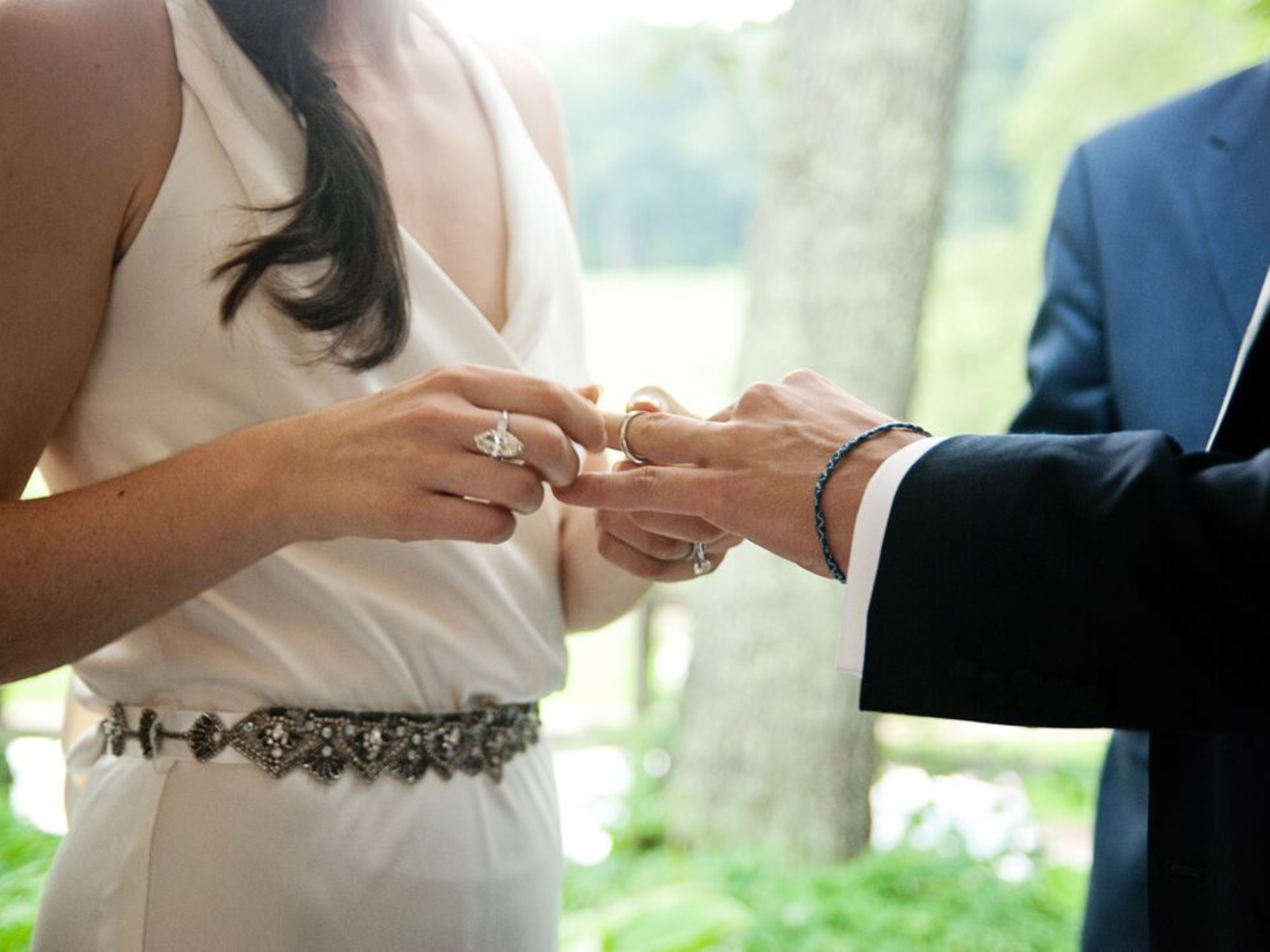
What is a wedding vow?
A wedding vow is a promise between two engaged people, traditionally shared verbally during the wedding ceremony, about the commitment they are making in marriage.
How long should vows be?
Two to three minutes is a good length for wedding vows. This wedding vow length allows for personalization without going overboard. Your partner probably knows more about you than anyone else, so it can be easy to go on and in about all the reasons you love them. However, save the lengthy monologue for a wedding card and keep your public vows short and sweet.
How do you start your wedding vows?
Most commonly, people start their wedding vows by saying their partner's name. A typical opening line for a wedding vow is: "[Name}, I vow to.." or "[Name], I promise to…"
How do you end your wedding vows?
Many couples end their wedding vows by simply saying "I love you." With traditional wedding vows, some couples end by saying "until we are parted by death. This is my solemn vow." or "this is my sacred vow before God."
How many words should vows be?
Ideally, your wedding vows should be 250 to 300 words. This length for wedding vows will take about two minutes to recite for most people speaking at an average pace of 125 to 150 words per minute.
How long does it take to write your own wedding vows?
You should start writing your wedding vows three months before the wedding. Although the final product should be short, the process of writing personal vows needs to be a bit longer. Waiting until the last minute isn't the way to go here. Give these promises the attention they deserve and start on them at least a month or more before the big day. It's a good idea to sit down and scribble out some initial ideas, but then take a break and come back to your draft a few days later with fresh eyes. Brooks notes that "it's important to start writing these months in advance as they will take much longer than you expect." Wedding planning expert Jaclyn Watson, owner of Jaclyn Watson Events, concurs, noting that "writing vows can be a daunting or a very meaningful task and the best way to start is by doing it sooner than later. Waiting until the last minute leads to a more stressful writing environment.
Can I get help writing my vows?
Absolutely! If you find yourself struggling to articulate your feels in words, then tapping a writer for help is a great option. Many wedding officiants are willing to help you iron out your vows, but there are even specific vow-writing companies you can hire for this very task. Your wedding vows are a proclamation of your love for your partner and a collection of promises you're vowing to adhere to within your marriage. With custom wedding vows, there's no one-size-fits-all approach, but that's the beauty of penning these words yourself. "Help is available," explains Franklin. "Even great writers will struggle to sum up their love in a minute or so. It's too close to the heart to be easy. Our business exists to provide professional help to make sure what's in your heart actually comes out the way you want it to."
Where should I write my wedding vows?
Initially, jotting down ideas as they come to you is a good idea for a first draft. However, once you've finalized your wedding vows, you'll want to transcribe them into a vow book so you have a keepsake to read from on the wedding day, instead of reading from a sheet of printer paper or a cell phone. "Keeping a notes section on your phone is an excellent idea as anytime you think of a verse, you can jot it down for when you are ready to write everything formally," says Brooks. "It's important to invest in a vows book, so you are not reading off your phone or a scrap piece of paper during the ceremony, not a good look for photos! Have your officiant read each of your vows to ensure they are of similar length and tone, as you don't want one to be the complete opposite." Many couples also turn their wedding vows into vow art after the wedding to memorialize the nuptials.
How can I overcome writer's block with wedding vows?
If you're feeling stuck, even after you've read through all the advice you can find about how to write vows brides will love and how to write vows grooms will love,
First and foremost, take a deep breath—don't let yourself get too stressed about your wedding vows. "Couples should avoid feeling like they have to summarize their entire relationship in their vows," says coach and officiant Maureen Cotton, owner of The Soulful Wedding. "The most essential vow is your commitment to the marriage, which is covered with your 'I do.' Your marriage will change so much over the years, and you can renew and even change them in the future. It's not a concrete summary of your relationship; it's the beginning of a promise that is alive and will grow as you do."
Cotton shares: "I think it's best to start deeper and aim higher than all of the formulas out there. I tell my couples to start by asking themselves this one question: What is something that only you can say to your beloved? On your wedding day, your officiant will be telling your love story, family members and best friends will give toasts celebrating you—they are sure to talk about your chemistry, how you balance each other or enjoy life together. Your vows are your chance to go deeper so you don't have to repeat all that: What is one thing that only you can say to your beloved? Answer that and you'll have unique vows from the heart."
Who goes first in wedding vows?
In traditional religious ceremonies between a groom and a bride, the groom says his wedding vows first. This is based on patriarchal religious traditions but is by no means a format that needs to be followed by couples.
Is it ok to read your wedding vows?
Yes, couples commonly write down their wedding vows and read them to one another during the ceremony. It's a good idea to practice ahead of time, but you don't need to memorize your wedding vows.
